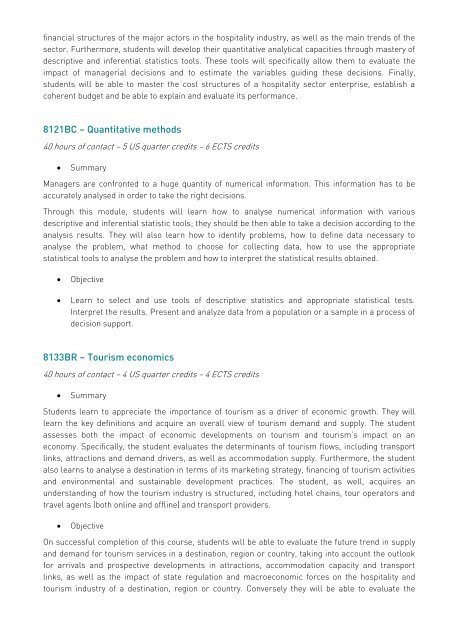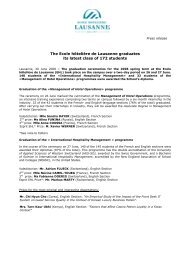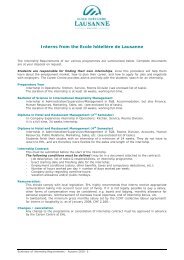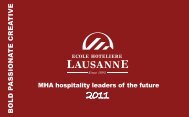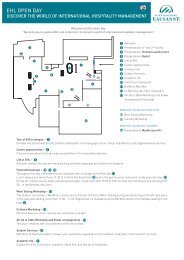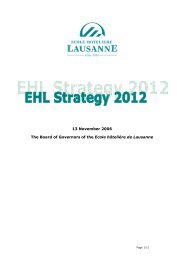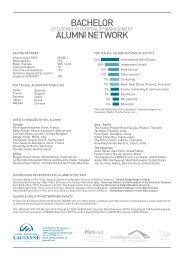EHL Course Catalogue 2011-2012 - Ecole Hôtelière de Lausanne
EHL Course Catalogue 2011-2012 - Ecole Hôtelière de Lausanne
EHL Course Catalogue 2011-2012 - Ecole Hôtelière de Lausanne
You also want an ePaper? Increase the reach of your titles
YUMPU automatically turns print PDFs into web optimized ePapers that Google loves.
financial structures of the major actors in the hospitality industry, as well as the main trends of the<br />
sector. Furthermore, stu<strong>de</strong>nts will <strong>de</strong>velop their quantitative analytical capacities through mastery of<br />
<strong>de</strong>scriptive and inferential statistics tools. These tools will specifically allow them to evaluate the<br />
impact of managerial <strong>de</strong>cisions and to estimate the variables guiding these <strong>de</strong>cisions. Finally,<br />
stu<strong>de</strong>nts will be able to master the cost structures of a hospitality sector enterprise, establish a<br />
coherent budget and be able to explain and evaluate its performance.<br />
8121BC – Quantitative methods<br />
40 hours of contact – 5 US quarter credits – 6 ECTS credits<br />
� Summary<br />
Managers are confronted to a huge quantity of numerical information. This information has to be<br />
accurately analysed in or<strong>de</strong>r to take the right <strong>de</strong>cisions.<br />
Through this module, stu<strong>de</strong>nts will learn how to analyse numerical information with various<br />
<strong>de</strong>scriptive and inferential statistic tools; they should be then able to take a <strong>de</strong>cision according to the<br />
analysis results. They will also learn how to i<strong>de</strong>ntify problems, how to <strong>de</strong>fine data necessary to<br />
analyse the problem, what method to choose for collecting data, how to use the appropriate<br />
statistical tools to analyse the problem and how to interpret the statistical results obtained.<br />
� Objective<br />
� Learn to select and use tools of <strong>de</strong>scriptive statistics and appropriate statistical tests.<br />
Interpret the results. Present and analyze data from a population or a sample in a process of<br />
<strong>de</strong>cision support.<br />
8133BR – Tourism economics<br />
40 hours of contact – 4 US quarter credits – 4 ECTS credits<br />
� Summary<br />
Stu<strong>de</strong>nts learn to appreciate the importance of tourism as a driver of economic growth. They will<br />
learn the key <strong>de</strong>finitions and acquire an overall view of tourism <strong>de</strong>mand and supply. The stu<strong>de</strong>nt<br />
assesses both the impact of economic <strong>de</strong>velopments on tourism and tourism‟s impact on an<br />
economy. Specifically, the stu<strong>de</strong>nt evaluates the <strong>de</strong>terminants of tourism flows, including transport<br />
links, attractions and <strong>de</strong>mand drivers, as well as accommodation supply. Furthermore, the stu<strong>de</strong>nt<br />
also learns to analyse a <strong>de</strong>stination in terms of its marketing strategy, financing of tourism activities<br />
and environmental and sustainable <strong>de</strong>velopment practices. The stu<strong>de</strong>nt, as well, acquires an<br />
un<strong>de</strong>rstanding of how the tourism industry is structured, including hotel chains, tour operators and<br />
travel agents (both online and offline) and transport provi<strong>de</strong>rs.<br />
� Objective<br />
On successful completion of this course, stu<strong>de</strong>nts will be able to evaluate the future trend in supply<br />
and <strong>de</strong>mand for tourism services in a <strong>de</strong>stination, region or country, taking into account the outlook<br />
for arrivals and prospective <strong>de</strong>velopments in attractions, accommodation capacity and transport<br />
links, as well as the impact of state regulation and macroeconomic forces on the hospitality and<br />
tourism industry of a <strong>de</strong>stination, region or country. Conversely they will be able to evaluate the


